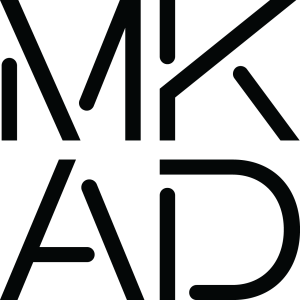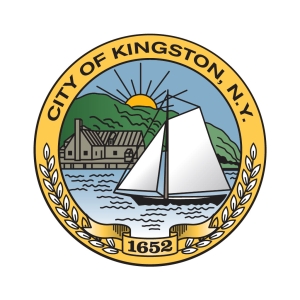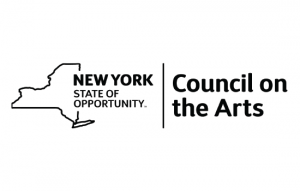The D.R.A.W.: Leading and Learning through the Arts
Workshops and Classes for People of All Ages
by Lynn Woods
Originally appeared in Kingston Times
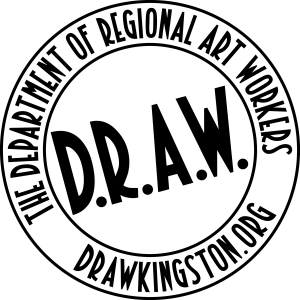 Kingston’s YMCA isn’t just the place to get fit; it’s also a place to make art. The D.R.A.W., aka The Department of Regional Art Workers, is a community arts education program that operates out of a spacious, light-filled room located in a corner of the Broadway building. The joyful creative output of this activity is evident in the hallway, where drawings of still-life arrangements, a clothed model, and portraits along with inventive comic strip narratives in ink and colorful depictions of glasses, scissors, a ketchup bottle and other objects, displayed under the banner “Plastic Hall of Shame”—the theme of one of the Kids’ Art Labs—are displayed. The studio space is outfitted with tables and chairs, shelves crowded with supplies, two presses, a light table, and silkscreen set up.
Kingston’s YMCA isn’t just the place to get fit; it’s also a place to make art. The D.R.A.W., aka The Department of Regional Art Workers, is a community arts education program that operates out of a spacious, light-filled room located in a corner of the Broadway building. The joyful creative output of this activity is evident in the hallway, where drawings of still-life arrangements, a clothed model, and portraits along with inventive comic strip narratives in ink and colorful depictions of glasses, scissors, a ketchup bottle and other objects, displayed under the banner “Plastic Hall of Shame”—the theme of one of the Kids’ Art Labs—are displayed. The studio space is outfitted with tables and chairs, shelves crowded with supplies, two presses, a light table, and silkscreen set up.
D.R.A.W.’s engagement with visual art “is part of holistic, healthy living,” said founder and executive director Lara Giordano, drawing a parallel with the Y’s physical fitness programs. Indeed, art making “is a vehicle to help people become human beings,” said JoAnn Ruisi, The D.R.A.W.’s artistic and program director. “Art always says something… and there’s no right answer. We provide an opportunity to be part of an artistic community.”
Giordano, a retired Kingston High School art teacher, started the initiative in 2015 with a visual-arts internship program for high school students called P.U.G.G., which utilized a pop-up gallery space on Broadway, and subsequently added the educational component of D.R.A.W. D.R.A.W. is now almost at full capacity, with classes and open studios scheduled six days a week. Giordano and Ruisi have recruited accomplished artists drawn from their circle of friends to teach the Saturday workshops, called Curated Shorts. The goodies coming up: Making a Box with Kaitlin Patterson of Little Mountain Books (Feb. 1), Mold Making with Kelly McGrath ((Feb. 15), Abstract Calligraphy with Jena Argenta (Feb. 29), Color Experience using acrylic paints with Tom Sarrantonio (March 14), Image Transfer and Watercolor Painting with Matt Kelly (March 21), Oil Stick Monotype and Collage with Cynthia Winika (March 28), and Writers & Artists Make Books with Maureen Cummins (who maintains a print shop in Brooklyn; Feb. 5, 12, 19, 26). A Monoprint workshop taught by Tatana Kellner on Sundays is sold out. The cost starts at $45 for the one-day workshops, which is especially reasonable considering D.R.A.W. provides all supplies.
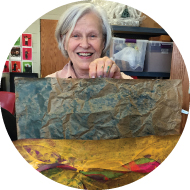 On Friday evenings, Stephen Lewis conducts a drawing and painting class working from the still life. The first Tuesday of each month, there’s life drawing with costumed models. On Tuesday mornings, older teens and adults can draw, paint, do collage and work in other media—the open studio is free for Y members. An open studio for teens is scheduled on Wednesday after school, facilitated by artist mentors.
On Friday evenings, Stephen Lewis conducts a drawing and painting class working from the still life. The first Tuesday of each month, there’s life drawing with costumed models. On Tuesday mornings, older teens and adults can draw, paint, do collage and work in other media—the open studio is free for Y members. An open studio for teens is scheduled on Wednesday after school, facilitated by artist mentors.
Professional artists also conduct the kids’ art labs. Noted costume designer and fabric sculptor Kate Hamilton is teaching the current after-school sessions on Thursdays for middle school students. Called Alternative Universe: What to Wear?, the lab has the class making fanciful art-clothing creations. They are learning how to use a sewing machine and make a basic pattern as well as experiment with recycled materials, and the lab will culminate in an exhibit and series of videos and performances. There’s also a Saturday morning drawing lab for middle school students and a Saturday afternoon art lab for first to fourth graders; both have a theme and encourage experimentation through painting, drawing, printmaking and sculpture.
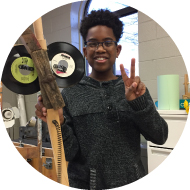 The youth art labs cost $30 a session, and scholarships are available (Y members get a discount). “We have a couple of kids on full scholarship,” said Giordano. “We want to provide these, provided the student is committed.” Teachers are paid $25 an hour, including an hour of prep. The P.U.G.G. interns, who earn high school credits, serve as teaching assistants in the classes and are paid $12 an hour (they average five hours a week and also help manage the studio space as well as organize exhibitions at the Kingston Artist Collective, on lower Broadway).
The youth art labs cost $30 a session, and scholarships are available (Y members get a discount). “We have a couple of kids on full scholarship,” said Giordano. “We want to provide these, provided the student is committed.” Teachers are paid $25 an hour, including an hour of prep. The P.U.G.G. interns, who earn high school credits, serve as teaching assistants in the classes and are paid $12 an hour (they average five hours a week and also help manage the studio space as well as organize exhibitions at the Kingston Artist Collective, on lower Broadway).
D.R.A.W. has been able to offer this full roster of classes partly because of its consolidation with the Kingston Midtown Arts District (MAD) a year ago, which has enabled Giordano and Ruisi to devote their energies to teaching. “MAD helps with the practical things like insurance, grant writing and keeping track of donations and grant money,” wrote MAD President Anne Bailey in an email. “D.R.A.W. does the outstanding creative work of providing art experiences for children and adults and also provides D.R.A.W.’s teaching artists paid work. It is a win-win in our community.”
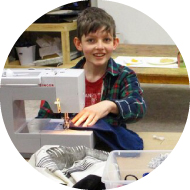 Indeed, D.R.A.W. “has become a powerful grass-roots educational program that is enriching our community in many ways,” wrote Bailey. “There are scholarships for those who cannot afford to pay. It also serves as a powerful tool for building awareness of the importance of the arts to our overall health. Many people who might not engage in art are doing so now through these programs. The D.R.A.W. is building self-esteem, self-awareness, and trust through these community art classes.”
Indeed, D.R.A.W. “has become a powerful grass-roots educational program that is enriching our community in many ways,” wrote Bailey. “There are scholarships for those who cannot afford to pay. It also serves as a powerful tool for building awareness of the importance of the arts to our overall health. Many people who might not engage in art are doing so now through these programs. The D.R.A.W. is building self-esteem, self-awareness, and trust through these community art classes.”
Besides collaborating with MAD and the Y (which offers the studio space for free—D.R.A.W. in return offers an intensive art program for participants in the Y’s Starfish summer camp), D.R.A.W. conducts teen art labs at the Kingston Library, free to any middle school student with a library card. It also did a project in conjunction with the Reher Center of Immigrant Culture and History.
In the future, the D.R.A.W. directors said they’d like to offer an artist-in-residency program, conduct special projects, and have more space, especially for storage. A bus would also be nice: a major limitation of the after-school programs is that many kids have no way to get there, since their parents work.
There will always be challenges, but D.R.A.W. is now rooted in the community and poised to grow. “Before, we were always hustling,” Giordano noted. Being part of MAD has “helped provide us with a salary for JoAnna and stabilized our P.U.G.G. program with work/study money. Curated Shorts have helped us with cash flow. Our goal is to make fine art accessible, which is why we focus on the after-school programs, even though they are not sustaining. We’ll always have to get grants.”
For more information and to register for a class, visit drawkingston.org.

